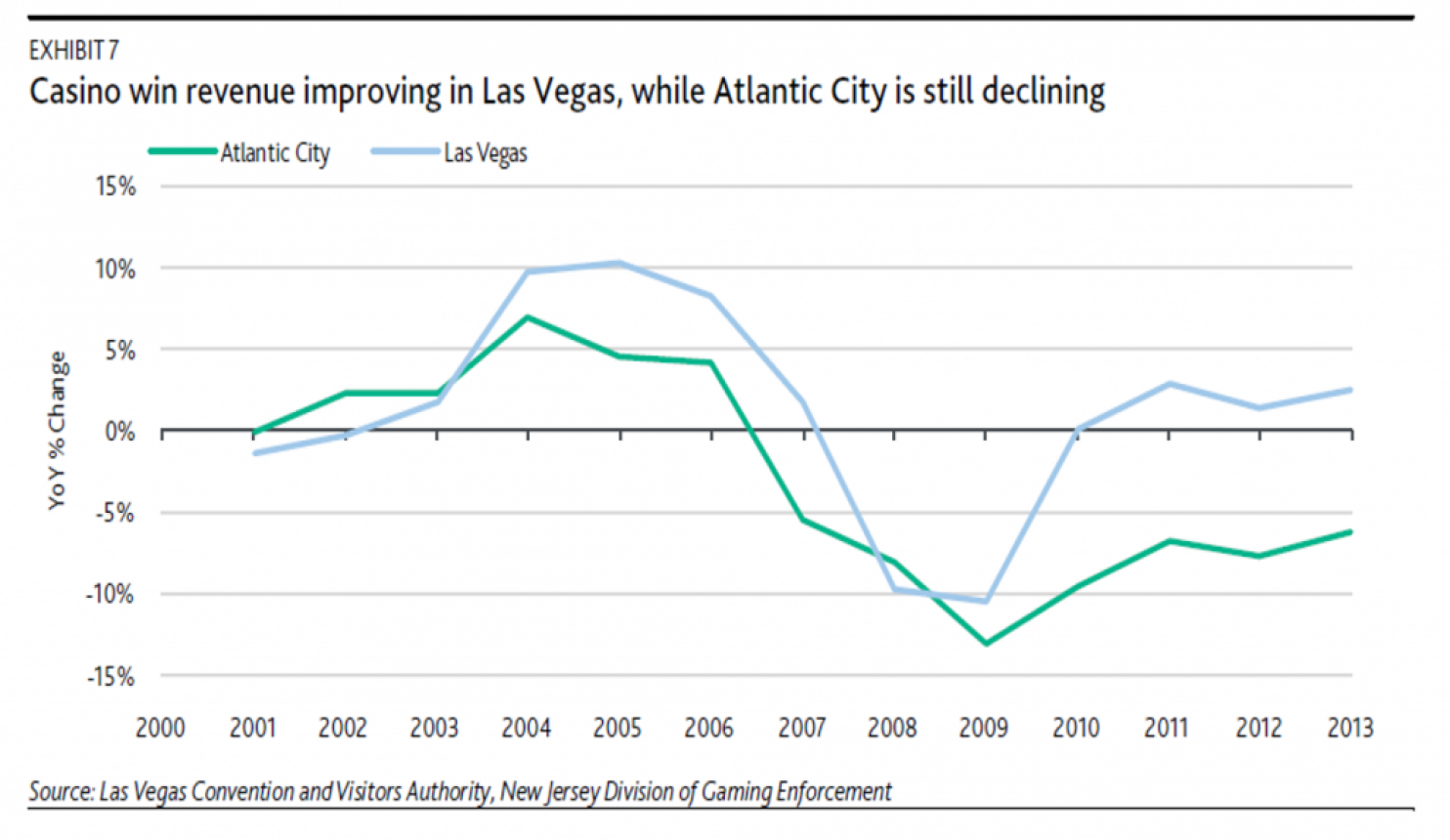Atlantic City was once the Mecca of American gambling east of the Rocky Mountains.
However, the Atlantic City gaming industry has suffered an unprecedented collapse over the past decade. What happened to the once-great gambling city?
Increased Competition
This single biggest factor contributing to the decline in Atlantic City is the legalization gambling in surrounding states. When New Jersey voted to legalize casino gambling in 1976, it became only the second state (after Nevada) to do so.
However, casinos were initially restricted to Atlantic City only, meaning that gamblers would travel from far and wide to come try their luck on the boardwalk.
Neighboring cities and states have also legalized casinos in recent years, and gamblers now have choices that are closer to home. Pennsylvania, which legalized casino gambling in 2004, has been one of the biggest drains on Atlantic City in recent years.
Why would New Yorkers travel 127 miles after a long work week to gamble in Atlantic City when Las Vegas Sands Corp. LVS 0.76% Sands Casino in Bethlehem, Pennsylvania is just 80 miles away?
As recently as three years ago, Atlantic City was the second largest gambling market in the country. Now, the Pennsylvania gambling market has overtaken second place, and it’s not difficult to see how Pennsylvania’s rising gambling revenues and Atlantic City’s falling gambling revenues are directly related.
Putting All The City’s Eggs In One Basket
One of the ways Atlantic City has gone wrong is by placing too much emphasis on gambling. Rather than making the city a must-see travel destination by building up the boardwalk and emphasizing the beaches and other forms of entertainment, development in the city has mostly been centered around the casinos.
Now that newer, more convenient casinos have been sprouting up all over the Northeast, there’s little reason left for many to travel to Atlantic City.
Even the Atlantic City casinos themselves focus almost exclusively on gambling rather than other forms of entertainment to draw visitors. In Las Vegas, only 34 percent of casino revenue comes from gambling.
The majority of revenue comes from retail, hotel rooms, conventions, shows and other entertainment. These other sources of revenue are what draw travelers to Las Vegas from all over the world. In Atlantic City, 78 percent of casino revenue comes from gambling.
The Fallout
The fall of Atlantic City has been staggering. The gross gaming revenue of the city in 2014 is down nearly 50 percent from its peak levels in 2006.
While Las Vegas has mounted a comeback since the credit crisis hobbled the gambling industry there during the most recent recession, Atlantic City remains crippled to this day.

Four of Atlantic City’s 12 casinos closed in 2014: Caesars Entertainment Corp CZR 0.17% and Tropicana Entertainment Inc’s TPCA 0.96% Atlantic Club casino, Caesars’ Showboat casino, Revel Entertainment Group’s Revel casino and Trump Entertainment Resorts’ Trump Plaza casino.
Losing 8,000 jobs is bad enough, but the dark, eerie silhouettes of the abandoned casinos are an eye sore for the city. The impression of the city as a ghost town is not exactly the image of fun and excitement that attracts visitors.
Hope For The Future?
Atlantic City has a long way to go before it regains its former glory as a must-see travel destination. However, several of the remaining casinos received some good news recently.
Despite an overall decline in Atlantic City gaming revenue in 2014, the eight remaining casinos saw their revenue increase by eight percent for the year. Borgata, a massive casino owned by MGM Resorts International MGM 0.86% and Boyd Gaming Corporation BYD 1.29% took in $687.2 million in revenue in 2014, up 10.7 percent year-over-year.
Landry’s Golden Nugget Casino upped its revenue a whopping 48.4 percent.
Read this article and all my other articles for free on Benzinga by clicking here
Want to learn more about the stock market? Or maybe you just want to be able to look sophisticated in front of your coworkers when they ask you what you are reading on your Kindle, and you’d prefer to tell them “Oh, I’m just reading a book about stock market analysis,” rather than the usual “Oh, I’m just looking at pics of my ex-girlfriend on Facebook.” For these reasons and more, check out my book, Beating Wall Street with Common Sense. I don’t have a degree in finance; I have a degree in neuroscience. You don’t have to predict what stocks will do if you can predict what traders will do and be one step ahead of them. I made a 400% return in the stock market over five years using only basic principles of psychology and common sense. Beating Wall Street with Common Sense is now available on Amazon, and tradingcommonsense.com is always available on your local internet!


